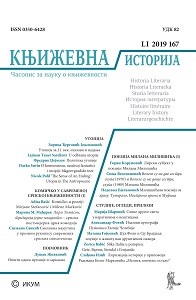Лиризација историје у приповеци Радована Белог Марковића „Мелита, ковчези, остало”
The Lyric Rendering of History in the Story ‘Melita, kovčezi, ostalo’ by Radovan Beli Marković
Author(s): Slađana IlićSubject(s): Serbian Literature
Published by: Институт за књижевност и уметност
Keywords: pogrom;Jews;World War II;political discourse;lyrical tone;glissando;fugue;narration;stylistic devices;grotesque;
Summary/Abstract: The short story „Melita, kovčezi, ostalo” (1983) by Radovan Beli Marković(1948) is the only one in the oeuvre of this writer that depicts the pogrom of Jews in the occupied Serbia during World War II as one of its most important topics. It is interesting, inter alia, because it contains elements of the political discourse and is narrated in a lyrical tone. The narrator uses some musical terms to conjure up the sequence of events. The structure of the narration has the same function, as well. The way of achieving a lyrical tone in the story is also impressive: by using tropes,some syntactic interventions, grotesque, biblical symbolism, catalogues, as well as the process of transferring the reality-based story to the unusual and mystic, etc.With these literary tools, the tragedy of historical events becomes the determinant which doesn’t damage the beauty of the story. At the same time, it allows a reader to experience the truth of an epoch through the destinies of the characters – ordinary people – more profoundly and more thoroughly than by reading the historiographical and sociological texts.
Journal: Књижевна историја
- Issue Year: 51/2019
- Issue No: 167
- Page Range: 301-314
- Page Count: 14
- Language: Serbian

